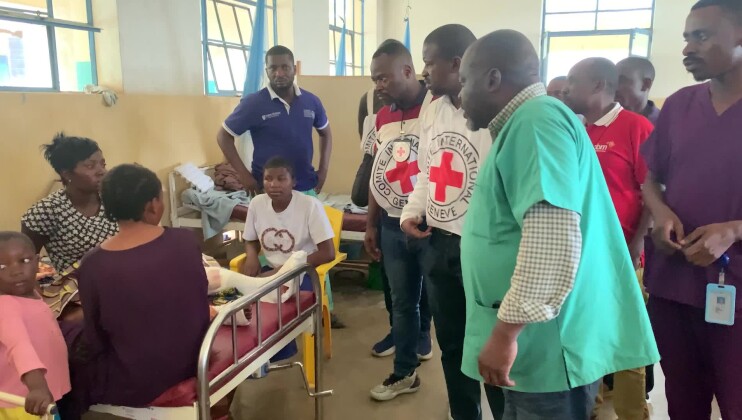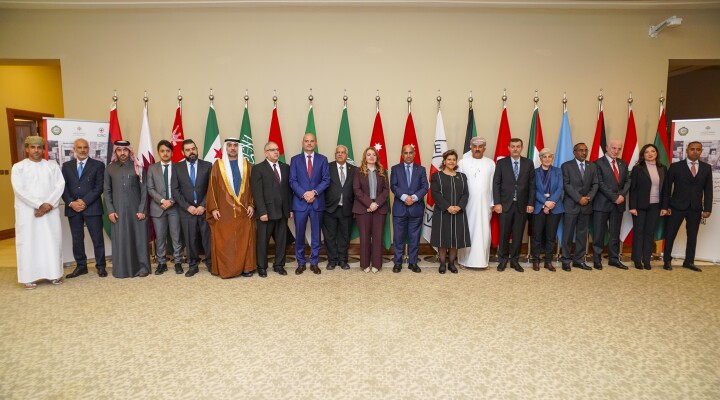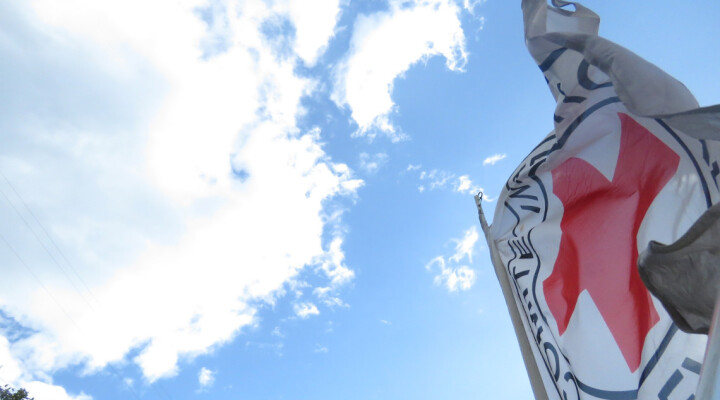Ukraine: ICRC president meets authorities, families of prisoners of war, and communities affected by the international armed conflict
The president of the International Committee of the Red Cross has completed a four-day visit to Ukraine, during which she traveled to Odesa, Mykolaiv, the Kherson region and Kyiv to meet with authorities, families of prisoners of war and communities affected by the armed conflict.
“I’ve seen a trail of destruction,” said ICRC President Mirjana Spoljaric. “I’ve seen destroyed houses, uprooted families. Power cuts have become the norm, and this is particularly problematic now that the winter sets in. This is why I continue to insist on the relevance and importance of international humanitarian law.”
Valeriy, local resident of Posad Pokrovskiy in the Kherson region, explains the level of destruction inflicted on his home in hostilities: “Our house has been heavily damaged. Everything has been destroyed. Everything we cared about, everything we earned through hard work – all of it has been destroyed."
In recent weeks ICRC teams have visited more prisoners of war held by Russia and Ukraine, allowing delegates to check their conditions and treatment, share news with their families, and provide personal items like blankets, warm clothes, hygiene products and books.
“I continue to insist that we have to be given access to all prisoners of war and to all civilian detainees wherever they are,” said President Spoljaric. “We have to carve out space for humanity, where it is most difficult to preserve humanity. This is precisely the reason why impartial and neutral humanitarian assistance was designed.”
During her visit, President Spoljaric met with Andriy Yermak, the head of the office of the president of Ukraine; Dmytro Kuleba, Minister of Foreign Affairs; the Parliament Commissioner for Human Rights; the heads of Kherson and Mykolaiv Regional Administrations; and the leadership of the Ukrainian Red Cross Society. Ms Spoljaric’s visit ended Sunday.
“I’m concluding my first visit to Ukraine as the new president of the International Committee of the Red Cross,” said President Spoljaric. “I am very thankful for the conversations and meetings I’ve had with authorities but also with the communities. I’ve met with families who are looking for their relatives or trying to reach them where they are detained. I’ve spoken with a young man who is desperately trying to find his brother.”
The ICRC, together with its partners of the International Red Cross and Red Crescent Movement, remains committed to helping those most affected by the international armed conflict in 2023. This includes working to urge respect of international humanitarian law and other applicable norms, including the protection of civilians and essential services.
For more information please contact:
Oleksandr Vlasenko, ICRC Kyiv (Ukrainian, English), +380 95 262 80 23, ovlasenko@icrc.org
Jesus Serrano, ICRC Kyiv (English, French, Spanish) +380 95 262 84 22, jserranoredondo@icrc.org
Crystal Wells (English), ICRC Geneva, +41 79 642 80 56, cwells@icrc.org
Jason Straziuso (English, French), ICRC Geneva, +41 79 949 35 12, jstraziuso@icrc.org
SHOTLIST
Length: 8:21 minutes
Date Of Filming: 8th December 2022
Camera: Yevgen Nosenko / Jesus Andrés Serrano Redondo / Shuzo Sato
Editor: Natalia Valchi
Copyright: ICRC access all
On Screen Credit: ICRC written or logo
SOUNDBITE:
00:00 – 01:23 Mirjana Spoljaric, president of the ICRC.
“I’m concluding my first visit to Ukraine as the new president of the International Committee of the Red Cross.
I am very thankful for the conversations and meetings I’ve had with authorities but also with the communities. I’ve met with families who are looking for their relatives or trying to reach them where they are detained. I’ve spoken with a young man who is desperately trying to find his brother.
I’ve seen a trail of destruction. I’ve seen destroyed houses, uprooted families. Power cuts have become the norm, and this is particularly problematic now that the winter sets in.
This is why I continue to insist on the relevance and importance of international humanitarian law. I continue to insist that we have to be given access to all prisoners of war and to all civilian detainees wherever they are.
We have to carve out space for humanity, where it is most difficult to preserve humanity. This is precisely the reason why impartial and neutral humanitarian assistance was designed.”
01:23 – 02:06 Cash delivery registration of families living in Mykolayiv and Kherson Oblast, with the help of Ukrainian Red Cross volunteers.
02:06 – 03:06 Valeriy, local resident of Posad Pokrovskiy in the Kherson region, shows the destruction of his house due to hostilities.
03:06 – 03:53 Valeriy speaks to camera.
Valeriy: “Our house has been heavily damaged. Everything has been destroyed. Everything we cared about, everything we earned through hard work – all of it has been destroyed. We live in very bad conditions. The roofs leak when it rains. We have been able to fix the shed ourselves though because our cattle are there, and we care about them. And we are getting by in a corner.”
Question: “How many times was your house hit?”
Valeriy: “The first shell fell in the yard, the second one near the gate, and I believe about five exploded in the garden. One unexploded artillery shell still lies there.”
03:53 – 05:00 People fill up bottles at the emergency water distribution points run by Ukrainian Red Cross volunteers and supported by the ICRC.
05:00 – 05:30 Ukrainian Red Cross staff and volunteers show President Spoljaric, president of the ICRC, where and how the water is filtered and delivered to the population.
05:30 – 07:00 Destroyed buildings in the Mykolaiv and Kherson Oblast region.
07:00– 7:56 President Spoljaric meeting with families of prisoners of war.
07:56 – 08:21 President Spoljaric meeting with Vitaly Kim, Governor of Mykolaiv Oblast.



